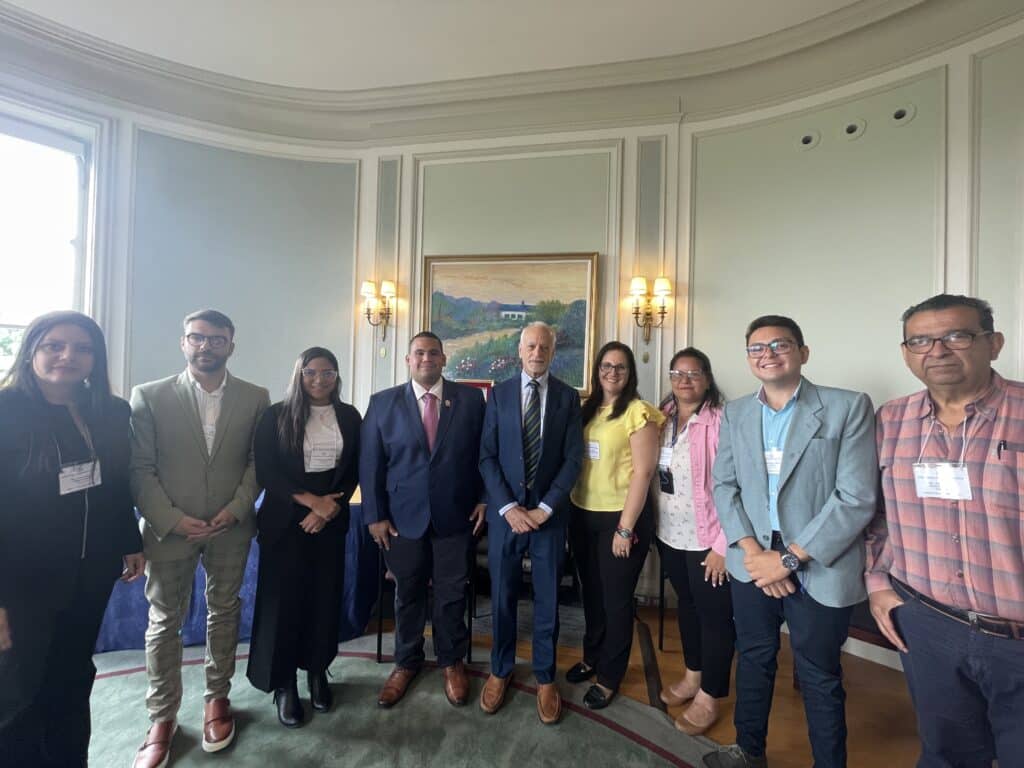On June 7, whistleblower attorney Michael Kohn delivered a speech at the Meridian International Center to a group of Venezuelan officials as part of the U.S. State Department’s International Visitor Leadership Program (IVLP). This IVLP initiative aims to promote transparency and accountability in Venezuelan state and local governments, as well as foster partnership between foreign officials and their American counterparts. Kohn addressed bribery and corruption in Venezuela through comparison to legislative developments in the United States, focusing specifically on the Foreign Corrupt Practices Act (FCPA).
Kohn, founding partner of the whistleblower law firm Kohn, Kohn & Colapinto LLP and President of the National Whistleblower Center has dedicated decades to advocating for whistleblowers, successfully securing numerous victories in cases against federal, state, and local governments.
To begin his talk, Kohn reflected on his extensive experience representing whistleblowers, as well as the evolving legal landscape concerning their protections. Whistleblowers play an “essential role in detecting and reporting crime,” he said, as well as “a pivotal role in identifying and reporting unlawful activities.”
Kohn then highlighted the transnational reach of the U.S. Securities and Exchange Commission (SEC) Whistleblower Program, which covers violations of the FCPA. This U.S. law, enacted by Congress in 1977, is a viable tool for Venezuelan whistleblowers to combat corruption within their country
Kohn emphasized the importance of disseminating information about this program, stating, “getting word out that this type of program exists is key,” primarily because “what is lacking is the knowledge of the program, lines of communication to use in the United States when someone has critical information from Venezuela.”
During his presentation, Kohn zeroed in on three standout characteristics of the statute: its global applicability, the guarantee of whistleblower anonymity, and the provision of significant financial incentives as a means to motivate whistleblowing.
Global reach
First, Kohn clarified that the FCPA allows anyone, regardless of their location globally, to file a report with the SEC. “This is applicable as long as the individual involved is either an American citizen or has dual American citizenship; or if the company conducts business within America, gets money from an American entity, or is publicly traded in any form,” he elaborated.
For whistleblowers, Kohn underscored, the burden of evidence isn’t as heavy as one might presume. He pointed out that whistleblowers “don’t necessarily need to have all the evidence” such as explicit evidence of bribes being paid. Instead, even “evidence of incorrect record keeping,” which can potentially harm American stockholders’ interests, is sufficient to bring foreign companies under the purview of the FCPA. This has significant implications for the oil and gas sector in Venezuela.
On an optimistic note, Kohn indicated that while there were no whistleblower reports coming from Venezuela in 2011, the number had risen to 17 by 2021. He stressed that with an increase in tips being received, the federal government is poised to intensify its investment in such investigations.
Anonymity
Delving into the second key provision of the FCPA, Kohn highlighted the robust mechanisms that ensure the anonymity of whistleblowers. “The FCPA allows whistleblowers to remain anonymous during the proceedings,” he noted.
Expounding on the operation of the FCPA in preserving a whistleblower’s identity, Kohn elaborated, “there are attorneys in the United States ready to represent you. You provide them with the information, and they file the report on your behalf, essentially keeping your identity undisclosed.” This approach permits whistleblowers to relay any quantity of information to the federal government, depending on their comfort and discretion.
“The federal government strictly adheres to these confidentiality protocols,” Kohn emphasized. “They ensure the opposing party doesn’t gain access to any information regarding the whistleblower’s identity.” He also confirmed the government’s active collaboration with whistleblowers and their attorneys to maintain absolute anonymity, noting that he has never seen a whistleblower’s identity compromised by the U.S.
Financial incentive
The third feature that Kohn highlighted of the FCPA was its financial incentive to any individual who discloses illegal activities to the SEC, allowing them to earn between 10 to 30 percent of the resulting penalties.
“The reward is more than just the size of the bribe, it also covers what the bribe is for,” explained Kohn.
To illustrate, Kohn proposed a scenario where a bribe payment amounted to five million dollars but was intended to secure a contract of the same value. In this case, the total penalty would escalate to ten million dollars, from which the whistleblower can potentially receive up to 30 percent.
Kohn also drew attention to recent SEC data, highlighting the United States had already accrued penalties of $20 billion by 2011—a staggering figure from over a decade ago. Kohn lauded this as indicative of “an exceedingly successful program.”
To conclude his address, Kohn cited a report from the University of Chicago’s business school. The study revealed that financial incentives substantially encourage whistleblowers to come forward and do not result in any adverse consequences. Drawing from his experience and long-term observations, Kohn firmly stated that “enhanced whistleblower protection is the only solution that works.”
At the end of the conference participants expressed gratitude to Kohn and his work protecting whistleblowers. In fact, one Venezuelan legislator told Kohn that he had “given her ideas for new laws” and “helped her see what is possible in her country.”
